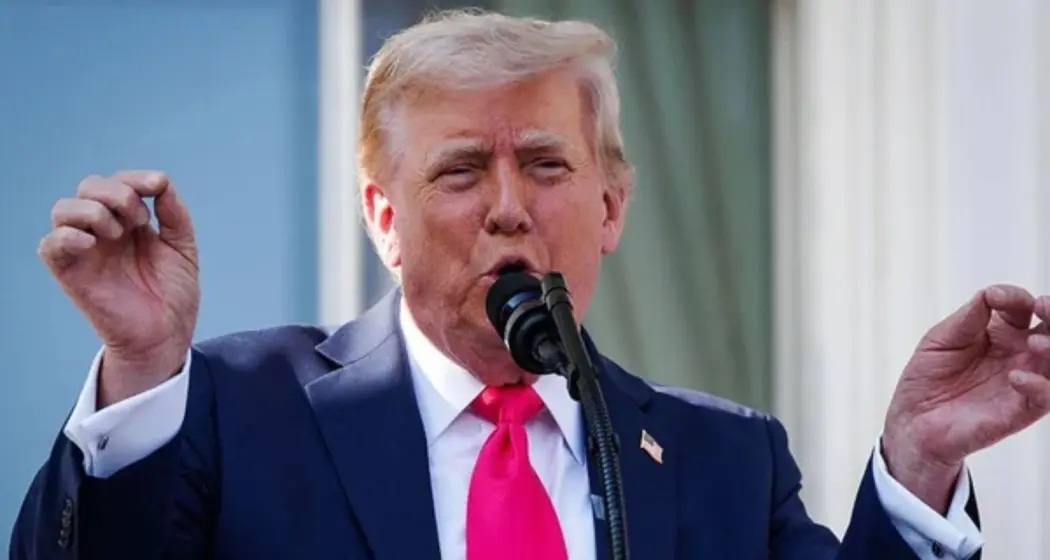U.S. President Donald Trump issued a renewed warning on Friday to countries aligned with the BRICS economic alliance, threatening them with an additional 10% tariff on their exports to the United States should they continue efforts to challenge the global dominance of the U.S. dollar.
The warning came during a White House event where Trump signed new cryptocurrency legislation into law.
While highlighting the importance of maintaining America’s financial supremacy, Trump accused the BRICS bloc of attempting to destabilize the dollar’s central role in global trade.
“We have this little group called BRICS, which is fading fast,” Trump said.
“They wanted to take on the dollar, its dominance, its status as the global standard.”
He went on to claim that his administration’s firm trade posture had already dissuaded BRICS members from advancing their agenda.
“They didn’t want to be tariffed.
“I hit them very hard, and it will end very quickly,” he added, suggesting that fear of U.S. retaliation had discouraged the bloc from holding further high-level meetings.
The BRICS group, originally comprising Brazil, Russia, India, China, and South Africa, expanded last year to include Egypt, Ethiopia, Indonesia, Iran, Saudi Arabia, and the United Arab Emirates.
The expanded bloc has debated the use of local currencies in cross-border trade to reduce reliance on the U.S. dollar.
However, its members remain divided on how aggressively to pursue de-dollarization.
India, a key BRICS member and U.S. strategic partner, recently distanced itself from any formal de-dollarization agenda.
On July 17, Indian Ministry of External Affairs spokesperson Randhir Jaiswal clarified, “Yes, BRICS has talked about promoting local currencies in cross-border payments, but de-dollarisation is not something currently on the agenda.”
Trump’s new tariff threat sets August 1 as the deadline for the implementation of the proposed 10% levy, following a July 9 cutoff for finalizing any bilateral trade agreements.
If deals are not reached by that time, countries involved would receive formal notification of the tariffs.
This isn’t the first time Trump has leveraged trade policy to push back against BRICS currency ambitions.
In 2024, he had threatened 100% tariffs on goods from BRICS nations if they moved forward with plans to launch an alternative global currency.
His latest remarks indicate a continuation of the tough stance he has often employed in trade negotiations to shield U.S. economic interests from what he views as geopolitical threats.
The recent comments also came in the wake of rising tensions between the U.S. and BRICS over foreign policy disagreements, particularly concerning military actions in the Middle East.
Earlier this month, Trump linked his proposed tariff hike directly to what he described as “anti-American policies” supported by the BRICS nations.
In a post on his social media platform, Truth Social, Trump stated unequivocally that the new tariffs would be applied across the board: “There will be no exceptions.”
His comments followed a joint declaration issued by BRICS leaders condemning recent U.S. military strikes in Iran and calling out Washington for what they described as “unilateral” economic measures.
The statement further criticized the humanitarian situation in Gaza and demanded that Israel withdraw its forces from Gaza and other occupied Palestinian territories.
By tying his trade threat to both economic and foreign policy disagreements, Trump signaled that his administration views BRICS not merely as an economic competitor but as a geopolitical challenge to U.S. influence on the global stage.
The BRICS bloc has yet to present a fully unified front on financial matters like de-dollarization.
On the other hand, Trump’s rhetoric suggests the U.S. is preparing for a broader confrontation — one that spans trade, currency dominance, and international diplomacy.
With August 1 approaching, countries aligned with BRICS face a critical decision.
They either comply with U.S. demands to maintain favorable trade conditions, or risk escalating tensions with Washington over their growing desire for economic autonomy and a multipolar financial order.
As the global economic landscape continues to shift, the conflict between defending established dominance and redefining global norms is likely to intensify.
This comes with the U.S. dollar squarely at the center of the battle.







